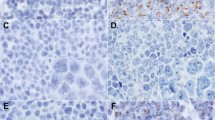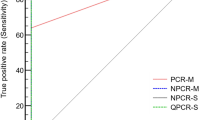Abstract
The specific, sensitive and reliable detection of mycoplasma contamination in cell cultures is an important part of mycoplasma control. We have sought to develop and validate a method for mycoplasma detection which is sensitive and accurate, but also practical in the sense of time spent, costs, and applicability in the standard laboratory; finally, the method should be suitable for screening large numbers of test specimens. To that end, we adapted a previously developed polymerase chain reaction (PCR) method for daily routine application. This single-step PCR uses a mixture of primers annealing to gene sequences coding for evolutionarily conserved 16S rRNA of different mycoplasma species, including the ones most commonly found in cell cultures. An internal control was introduced to exclude any false-negative tests resulting from technical PCR problems. This mycoplasma detection by PCR has been validated prospectively on 201 consecutive leukemia–lymphoma cell lines received at the institute over a 3-year period and on 118 initially positive cell lines after anti-mycoplasma treatment with antibiotics. The sensitivity (detection of true positives) of this PCR detection assay was 96% and the specificity (detection of true negatives) was also 96%, with positive and negative predictive values (probability of correct result) of 86% and 99%, respectively. PCR defined the mycoplasma status with 96% accuracy (detection of true positives and true negatives). Besides the high sensitivity and specificity, further attractive features of the PCR approach are the ease and speed with which large numbers of specimens can be tested. PCR mycoplasma analysis provides a readily available, quick and reliable test system with which to manage the important issue of mycoplasma contamination of cell lines.
This is a preview of subscription content, access via your institution
Access options
Subscribe to this journal
Receive 12 print issues and online access
$259.00 per year
only $21.58 per issue
Buy this article
- Purchase on Springer Link
- Instant access to full article PDF
Prices may be subject to local taxes which are calculated during checkout


Similar content being viewed by others
References
Drexler HG, Uphoff CC . Contamination of cell culture, mycoplasma. In: Spier E et al (eds) The Encyclopedia of Cell Technology Wiley: New York 2000 pp 609–627
Uphoff CC, Brauer S, Grunicke D, Gignac SM, MacLeod RAF, Quentmeier H, Steube K, Tümmler M, Voges M, Wagner B, Drexler HG . Sensitivity and specificity of five different mycoplasma detection assays Leukemia 1992 6: 335–341
Uphoff CC, Gignac SM, Drexler HG . Mycoplasma contamination in human leukemia cell lines. I. Comparison of various detection methods J Immunol Methods 1992 149: 43–53
Razin S . DNA probes and PCR in diagnosis of mycoplasma infections Mol Cell Probes 1994 8: 497–511
Drexler HG (ed). The Leukemia–Lymphoma Cell Line FactsBook Academic Press: San Diego 2000
Drexler HG, Dirks WG, MacLeod RAF, Quentmeier H, Steube KG, Uphoff CC (eds). DSMZ Catalogue of Human and Animal Cell Lines, 8th edn Braunschweig, Germany 2001
Uphoff CC, Meyer C, Drexler HG . Elimination of mycoplasma from leukemia-lymphoma cell lines using antibiotics Leukemia 2002 16: 284–288
Hopert A, Uphoff CC, Wirth M, Hauser H, Drexler HG . Specificity and sensitivity of polymerase chain reaction (PCR) in comparison with other methods for the detection of mycoplasma contamination in cell lines J Immunol Methods 1993 164: 91–100
Wirth M, Berthold E, Grashoff M, Pfutzner H, Schubert U, Hauser H . Detection of mycoplasma contaminations by the polymerase chain reaction Cytotechnology 1994 16: 67–77
Uphoff CC, Hu ZB, Gignac SM, Ma W, Rainey FA, Kreutz M, Ludwig WD, Drexler HG . Characterization of the monocyte-specific esterase (MSE) gene Leukemia 1994 8: 1510–1526
Uphoff CC, Drexler HG . Detection of mycoplasma contaminations in cell cultures by PCR analysis Human Cell 1999 12: 229–236
Author information
Authors and Affiliations
Rights and permissions
About this article
Cite this article
Uphoff, C., Drexler, H. Detection of mycoplasma in leukemia–lymphoma cell lines using polymerase chain reaction. Leukemia 16, 289–293 (2002). https://doi.org/10.1038/sj.leu.2402365
Received:
Accepted:
Published:
Issue Date:
DOI: https://doi.org/10.1038/sj.leu.2402365
Keywords
This article is cited by
-
A systems study reveals concurrent activation of AMPK and mTOR by amino acids
Nature Communications (2016)
-
A multi-laboratory profile of Mycoplasma contamination in Lawsonia intracellularis cultures
BMC Research Notes (2012)
-
The percentage of CD133+ cells in human colorectal cancer cell lines is influenced by Mycoplasma hyorhinis infection
BMC Cancer (2010)
-
Widespread microbial invasion of the chorioamniotic membranes is a consequence and not a cause of intra-amniotic infection
Laboratory Investigation (2009)
-
Tandem use of immunofluorescent and DNA staining assays to validate nested PCR detection of mycoplasma
In Vitro Cellular & Developmental Biology - Animal (2008)



